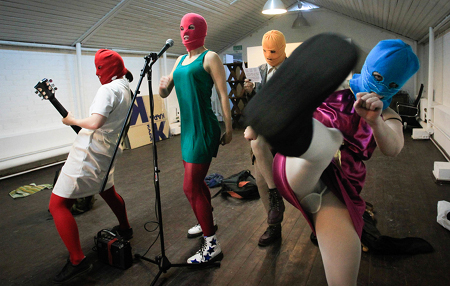One of the most culturally and politically relevant films to come out of Sundance this year, Pussy Riot: A Punk Prayer chronicles the controversial trial of three members of the anonymous Russian performance artists and political activists who call themselves Pussy Riot. Comprised of about a dozen young women who mask their faces with colorful balaclavas and stage stealth performances around Moscow, showing up when least expected in a beauty parlor or Red Square or on the rooftop of a building to raise their voices in protest of Russian president Vladimir Putin, the lack of separation between the Russian state and the Russian Orthodox church, and sexism within Russian society.
For a while, Putin’s government mostly ignored Pussy Riot, handing out the occasional administrative ticket but nothing more, as if hoping that these rebellious young women might just quietly go away. Then on February 21, 2012, five members of the group staged a performance of their church-state protest song “A Punk Prayer” on the alter of St. Christ the Saviour Cathedral in Moscow. The group played about 30 seconds of their song before being shut down. Three of the members, Nadezhda (Nadia) Tolokonnikova, Maria (Masha) Alyokhina and Yekaterina (Katia) Samutsevich were arrested and charged with criminal charges, and were detained for six months before finally being put on trial, facing a courtroom full of “victims” – those who were at the church that day and were apparently traumatized by the sight of five young women wearing brightly colored balaclavas, baring their arms, and singing punk rock music on the altar of their church.
In Russia, contemporary art is often scorned and misunderstood, and performance art and punk rock practically unheard of. And in a place where the Russian Orthodox Church was persecuted under the reign of the Communists, sacrilege can be seen as a tremendous offense. When the members of Pussy Riot were first charged, there wasn’t a great deal of support inside Russia for these young activists. But as word got out that they were facing up to seven years in prison for singing 30 seconds of punk rock protest, a groundswell of support both inside Russia and around the world grew in support of their activism and their cause. Amnesty International got involved. International news media flocked to Moscow. Pussy Riot support groups sprung up, the little seeds of dissent planted by the young activists taking root and starting to sprout. Even Madonna painted “Pussy Riot” on her bare back and sang “Like a Virgin” while wearing a balaclava in her Moscow concert.
Cinematically speaking the film is, like the movement it captures, more than a little rough around the edges. There’s an awful lot of courtroom footage, so much so that it starts to drag a bit and feel like an extended episode of Court TV, but it’s still impressive that the filmmakers were able to get the access to shoot in there. The performance footage is most engaging, when we see the girls of Pussy Riot rehearsing and performing; it’s guerrilla activism, shot guerrilla style, and it’s just great that it was even captured for historical purposes, given that the Pussy Riot collective has become a big enough deal to be of note as one of the more relevant and effective activist groups of our time, along with Occupy. Interviews with the girls’ parents round things out nicely, giving us a broader perspective on who these young women are.
The real stars of the show here are Nadia, Katia and Masha, the three young women at the center of this story. While all three are articulate and have some interesting things to say, it’s clear that Nadia is the leader of the group. She has a fierceness to her, a sharpness of intellect, clearness of jaw, firmness in the stubborn set of her mouth, that lets you know she is not even close to done. The penultimate moment of the film is Nadia’s closing statement, in which she says in part:
This whole trial refuses to hear us and I mean hear us, which involves understanding and, moreover, thinking. I think every individual wants to attain wisdom, to be a philosopher, not just people who happen to have studied philosophy. That’s nothing. Formal education is nothing in itself and Lawyer Pavlova is constantly accusing us of not being sufficiently well-educated. I think though that the most important thing is the desire to know and to understand, and that’s something people can do for themselves outside of educational establishments, and the trappings of academic degrees don’t mean anything in this instance. Someone can have a vast fund of knowledge and for all that not be human.
You can read her full closing statement here, or you can find on YouTube in its entirety if you’re so inclined. It’s worth it.
In a scene where a group of male Russian Orthodox leaders are discussing the Pussy Riot performance at the cathedral, bemoaning in particular the dangerousness of the articulate Nadia, one of the men notes that she’s “a demon who thinks.” And so she is, and so are all of them.












